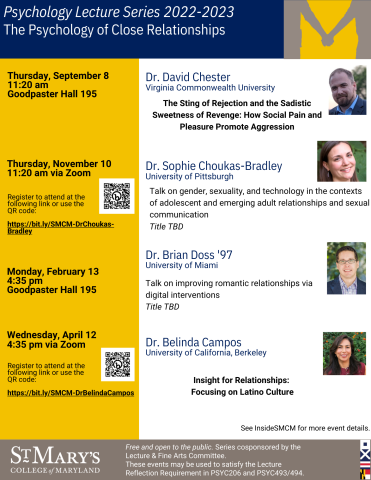Audience

The psychology department welcomes you to join us for this year's lecture series which will explore will explore various elements of the Psychology of Close Relationships by inviting four social scientists who study close relationships from varied disciplinary perspectives such as social psychology (e.g., relationship threat, social rejection, revenge), developmental psychology (e.g., the development of close relationships, social rejection understanding, language development), clinical/counseling psychology (e.g., couples therapy and relationship interventions), health psychology (e.g., the effect of close relationships on health), and/or cognitive psychology (e.g., language and cognitive costs of romantic breakup).
Two of the four speakers will give virtual lectures with registration required. After registering, you will receive a confirmation email containing information about joining the meeting.
Thursday, September 8 @ 11:20 am - 12:10 pm; Goodpaster Hall 195
Dr. David Chester (Virginia Commonwealth University) will present “The Sting of Rejection and the Sadistic Sweetness of Revenge: How Social Pain and Pleasure Promote Aggression.” Close relationships entail attraction and sadly, rejection. In this talk, we will first look across psychological and neural evidence to examine how people might combat the pain of rejection with the pleasure of revenge and how this tendency might feed into broader patterns of sadistic aggression. Then, we will look to the future and have a discussion about where science should go next to best understand and reduce aggression in close relationships.
Thursday, November 10 @ 11:20 am - 12:10 pm; Virtual
Register at https://bit.ly/SMCM-DrChoukas-Bradley
Dr. Sophie Choukas-Bradley (University of Pittsburgh) will present “topic TBD.” She is the director of the Teen and Young Adult Lab, a research group that studies interpersonal and sociocultural influences on adolescent mental health, with an emphasis on gender, sexuality, social media use, body image, LGBTQ+ youth, and intersectionality. Dr. Choukas-Bradley also maintains a blog on the Psychology of Adolescence for Psychology Today.
Monday, February 13 @ 4:35 pm - 5:20 pm; Goodpaster Hall 195
Dr. Brian Doss '97 (University of Miami) will present “topic TBD.” Dr. Doss' research focuses on ways to use digital technologies to improve couples’ romantic relationships – with a special focus on low-income couples, couples in which one person is a veteran or active-duty service member, and couples in which one person is a breast cancer survivor.
Dr. Doss has received grants from the National Institutes of Health (NIH), the Administration for Children and Families (ACF), and the Patient-Centered Outcomes Research Institute (PCORI). He teaches undergraduate and graduate classes on couple therapy and romantic relationships. His research is focused on ways to increase the reach of couple interventions, including online interventions (www.OurRelationship.com), apps, and a self-help book titled Reconcilable Differences. Dr. Doss’ research has been cited on The Today Show, CNN, MSNBC, the New York Times, the Miami Herald, and elsewhere.
Wednesday, April 12 @ 4:35 pm - 5:20 pm; Virtual
Register at https://bit.ly/SMCM-DrBelindaCampos
Dr. Belinda Campos (University of California, Berkeley) will present “Insight for Relationships: Focusing on Latino Culture”.
Social relationships can confer high subjective well-being, resilience against adverse circumstances, and benefits for health. To reap these rewards, humans must balance self-interest and other-interest. In this talk, Dr. Campos asserts that Latino contexts are of theoretical and applied interest for studying these questions and will present a series of studies that show that Latino cultural values that emphasize other-interest are associated with benefits for relationship quality and have implications for health.
